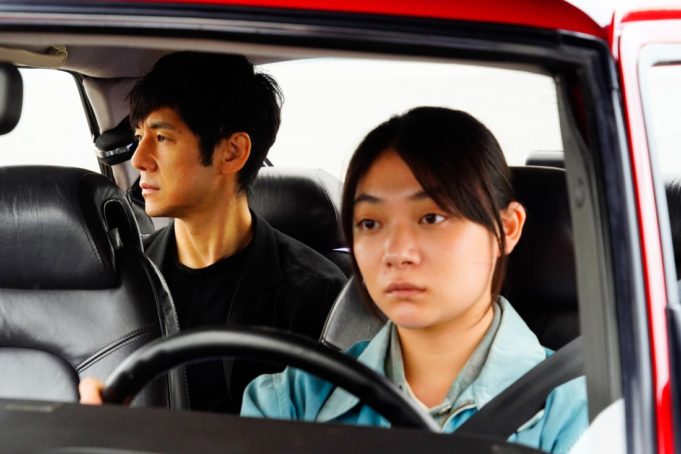By now you’ve probably heard a great deal about Drive My Car, but you still might not know what it is. It is a lot of things, as you might expect from a three-hour film. It’s a movie about long car rides, hence the title. It’s the presumptive front runner for the foreign film Oscar and a surprise nominee for Best Picture. It’s a worthy entry in the great tradition of quiet, slow-paced Japanese dramas with an emphasis on character study. It’s an adaptation of a story by Haruki Murakami, probably Japan’s best writer right now. It’s a philosophical inquiry into grief and loss. It’s a movie about actors putting on a play. The film previously played at the Modern Art Museum of Fort Worth, but if you missed that, Grand Berry Theatre is giving you a prime chance to make that up.
In the 40-minute pre-credit sequence, we meet our main character, Yūsuke Kafuku (Hidetoshi Nishijima), a former actor who has become one of Japan’s leading theatrical directors by staging multilingual productions of classics like Waiting for Godot. He shuts down emotionally when he returns home one day to find his TV writer wife Oto (Reika Kirishima) having sex with Takatsuki (Masaki Okada), a young actor from her show. After a few weeks of pretending he didn’t see what he saw, Kafuku comes home from a night of driving around Tokyo and finds her dead from a brain hemorrhage.
The bulk of the story takes place two years later, when he’s helming a production of Chekhov’s Uncle Vanya at a festival in Hiroshima. The same Takatsuki auditions, and is surprised to be cast in the title role. Does Kafuku want to get closer to this man who knew Oto intimately? Or does he want to publicly embarrass the actor in his early 30s by having him play the 47-year-old Vanya? Liability issues force Kafuku to be chauffeured in his ancient red Saab between the theater and his hotel by a driver named Misaki Watari (Tōko Miura), and he passes the time by listening to an audio recording Oto made before her death, reading dialogue from the Chekhov play to help him run lines.
The production plays out in a riot of languages, as Kafuku and his assistant director (Jin Dae-yeon) communicate with their cast in English and Korean as well as Japanese, while the actors perform in Mandarin, Tagalog, and Korean Sign Language. Like Certified Copy — another movie with long conversations in cars — this film cogitates on how language can be a barrier to communication as well as how people overcome that. A compelling sidebar takes place at the assistant director’s house, where his mute but not deaf wife who happens to be portraying Sonya (Park Yu-rim) explains how she came to acting as a former dancer. Misaki witnesses that conversation, and it encourages the taciturn and businesslike driver to open up to the man who spends all those hours in the back seat.
“Chekhov is terrifying. He drags out the real you,” Kafuku tells his lead actor to explain why he gave up acting. This kicks off a magnificent 20-minute scene between them in the back seat of his car. Takatsuki is available for the play because sexual assault and statutory rape allegations — denied, of course — have made him toxic to film and TV projects, and Kafuku witnesses his violent temper firsthand when the actor manhandles a passer-by who tries to take his picture. So it’s incredibly moving when this thespian who can’t control himself faces Kafuku with tears in his eyes and tells him that no matter how much you love someone, you can’t know them completely unless you know yourself, flaws and all. The unfussy scene soars on the incredible strength of the dialogue and performances. No wonder Misaki, who overhears this, reacts by telling Kafuku, “I don’t think he was lying. I grew up surrounded by liars.” Shortly after that, the police come to take Takatsuki away, and he goes quietly.
Tragic as that is, the full warmth and humanity of this masterpiece comes in the aftermath, when Kafuku asks his driver to take him from the south of Japan to the northern tip to see the ruins of her village that was destroyed by a landslide. There, these two traumatized people find catharsis through their experience with great art and the need to make conversation on a long trip. Like Chekhov’s characters, the ones in Drive My Car find ways to keep living, and Hamaguchi finds beauty in their resilience and will to endure. The final shot of Misaki settling into her new life in South Korea and driving her own car alone is worth the running time.
Drive My Car
Starring Hidetoshi Nishijima and Tōko Miura. Directed by Ryusuke Hamaguchi. Written by Ryusuke Hamaguchi and Takamasa Oe, based on Haruki Murakami’s short story. Rated R.












